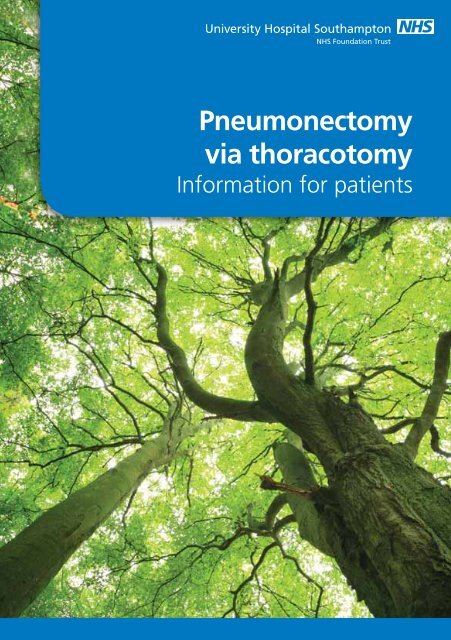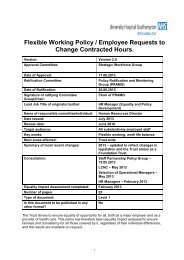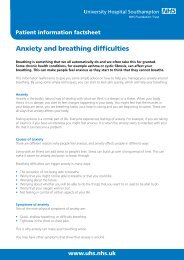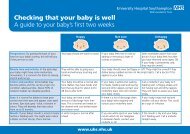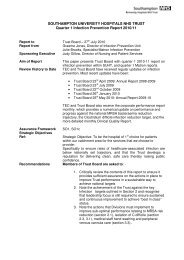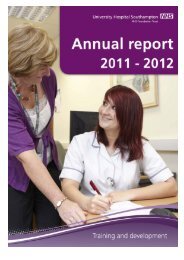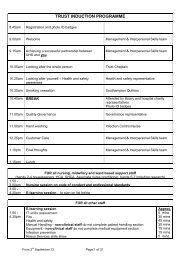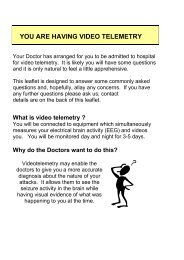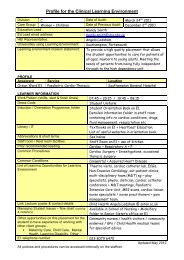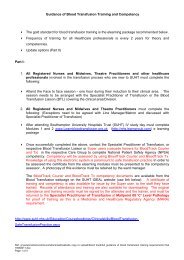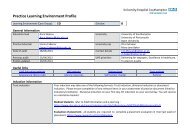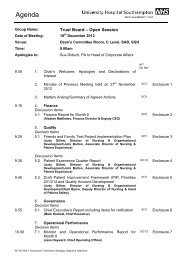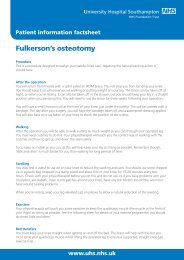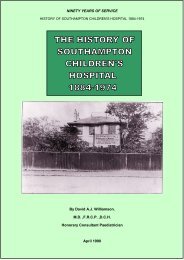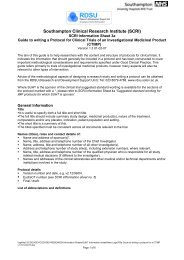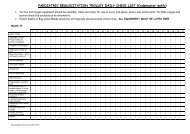Pneumonectomy via thoracotomy - University Hospital Southampton ...
Pneumonectomy via thoracotomy - University Hospital Southampton ...
Pneumonectomy via thoracotomy - University Hospital Southampton ...
Create successful ePaper yourself
Turn your PDF publications into a flip-book with our unique Google optimized e-Paper software.
<strong>Pneumonectomy</strong><br />
<strong>via</strong> <strong>thoracotomy</strong><br />
Information for patients
This booklet will explain the reasons for the operation, the procedure<br />
itself and potential risks involved. It will also explain about the care<br />
you will need before and after the operation. Please feel free to ask<br />
any questions raised or not addressed by this booklet. The doctors and<br />
nurses are available to support you at this time.<br />
Thoracotomy is an incision made on the chest to gain access to organs<br />
within it. <strong>Pneumonectomy</strong> is removal of a whole lung.<br />
Patients are referred to a thoracic (chest) surgeon for management<br />
and/or investigation of an abnormality found in the lung. This includes<br />
known or suspected lung cancers and other conditions such as chronic<br />
infection. Published evidence indicates successful surgery of early stage<br />
lung cancer gives the best chance of a cure, although no treatment<br />
offers a guarantee. In most cases of lung cancer it is normal to remove<br />
just one of the lobes of the lung, but in some cases, often due to the<br />
position of the lesion, the whole lung has to be removed. The lymph<br />
nodes (glands) that are connected to that lung are also removed. All<br />
the tissue removed is sent to the laboratory for analysis. Based on the<br />
results patients may benefit from chemotherapy and or radiotherapy<br />
after surgery.<br />
During your outpatient appointment you will have discussed with your<br />
surgeon the reasons for offering surgery, risks and benefits, what is<br />
involved and alternative treatments.<br />
If you are unwilling or unfit for surgery, your surgeon will provide<br />
guidance on alternative treatment options.<br />
It is your decision to choose surgery or other forms of treatment. The<br />
doctors and nurses will be available to offer information, advice and<br />
support at this time, so please feel free to ask any questions and discuss<br />
concerns you may have.<br />
Following a pneumonectomy most patients will be able to return to<br />
normal activities but with some modifications. You will need to take<br />
things at a slower pace than before.<br />
If you are concerned about returning to work after this type of surgery,<br />
please discuss this with your surgeon.<br />
Surgery<br />
The operation is done under a general anaesthetic and takes between one and<br />
three hours. It is routine practice to check the airway for any abnormality. This<br />
is done by putting a bronchoscope (surgical telescope) into your windpipe <strong>via</strong><br />
your mouth.<br />
You will then be positioned on your side with your arm above your head.<br />
The surgeon will make a cut starting under your shoulder blade, along the line<br />
of the rib. The ribs are separated from each other to gain access to the organs<br />
within. Occasionally ribs may be broken during this procedure.<br />
If the diagnosis has not been established, a sample of the abnormal tissue may<br />
be sent to the laboratory for a quick analysis while you are under anaesthesia.<br />
This is called a frozen section examination and normally adds 20 minutes to<br />
the length of the operation.<br />
If lung cancer is confirmed, the surgeon will remove the lung together with<br />
the lymph nodes.<br />
At the end of the procedure, the wound will be closed with stitches in layers.<br />
Most surgeons use absorbable stitches under the skin. The stitches will dissolve<br />
over the next few months and therefore do not need to be removed.<br />
The surgeon will leave a chest tube in the space where the lung was. This will be<br />
clamped and the clamps will be removed every few hours for a few minutes at a<br />
time. The drain will be secured with a stitch and an additional one to close the<br />
skin when the drain is removed. The drain normally stays in for 24 hours. The<br />
stitch will need to be removed about seven to ten days after the drain comes<br />
out. This can be done at your GP practice or by the district nurse.<br />
The lung and lymph nodes removed will be sent to the laboratory for analysis.<br />
4 Pleural biopsy and drainage of pleural effusion<br />
Information for patients 35
Changes to the planned surgery<br />
On rare occasions unexpected findings come to light during the operation.<br />
These factors may influence the method and extent of your surgery. This<br />
means that sometimes it is not possible for the surgeon to remove the lesion. If<br />
this happens your surgeon will explain other treatment options available to<br />
you. These may include chemotherapy and radiotherapy.<br />
The surgeon will only do what is appropriate to your condition and will always<br />
explain the reasons if there has been any change to the planned procedure.<br />
Preparation for surgery<br />
If you smoke we strongly recommend that you stop smoking before your<br />
operation.<br />
We know that patients who smoke up to four weeks before chest surgery run<br />
a higher risk of developing complications after surgery.<br />
You may be admitted to hospital the day before your operation.<br />
To reduce the risk of infection, you will need to have a bath, or shower in an<br />
antiseptic solution the night before your operation. We will give you this<br />
special liquid soap.<br />
You must not eat anything after midnight the night before your operation.<br />
After midnight you can only drink water, and you must stop this at 6am.<br />
If you take any medications the nurses will advise you which you may take<br />
before your operation.<br />
On admission you will need to have the following tests.<br />
• Blood tests<br />
• ECG – heart tracing<br />
• Chest x-ray<br />
• A full set of observations - blood pressure, pulse, oxygen levels,<br />
temperature, respiratory rate, weight and height.<br />
4 <strong>Pneumonectomy</strong> <strong>via</strong> <strong>thoracotomy</strong><br />
On the morning of your operation you may need to have your chest, back and<br />
underarm shaved with special clippers. You will need to have another bath,<br />
shower, or full wash and a hair wash in the antiseptic solution. After this you will<br />
be asked to put on a hospital gown. We will also give you compression stockings<br />
to wear, which help to prevent you developing blood clots in your legs.<br />
All patients are screened for MRSA on admission by doing a nose and groin swab.<br />
A nurse will need to complete some paperwork with you and a doctor or nurse<br />
specialist/practitioner will take a medical history and do an examination. This<br />
may have been done in a pre-admission clinic.<br />
The anaesthetist will see you to discuss having a general anaesthetic. We do<br />
not routinely give pre-medications; however if you are particularly anxious then<br />
please mention this to the anaesthetist.<br />
If you need other tests specific to you these will be explained.<br />
The procedure will be explained to you again and any questions you may have<br />
will be answered.<br />
Once everything has been completed a doctor will ask you to sign a consent<br />
form giving your permission (consent) for the operation to take place.<br />
Before your operation a doctor will mark the side you are to be operated on.<br />
Please let a member of staff know if this gets washed off.<br />
We will give you two name bands to wear, with the ward, your name, date of<br />
birth and hospital number. If you are allergic to anything you will also need to<br />
wear a red band. Please let a member of staff know if you lose one, or if any<br />
of the information is incorrect.<br />
Before going to theatre the nurses will complete a check-list with you. This will<br />
be repeated several times when you go to theatre. This is for your safety.<br />
Information for patients 5
6<br />
After the operation<br />
After the operation you will be taken to the recovery room. The staff will be<br />
constantly monitoring you and making you comfortable. Once they are happy<br />
with your condition you will return to the ward. You will normally stay in<br />
recovery for about two to four hours.<br />
When you get back to the ward you will go to an area where you will be<br />
closely monitored for the first part of your recovery.<br />
You will have oxygen <strong>via</strong> a mask and your oxygen levels will be monitored<br />
regularly over the next few days. You will feel short of breath to begin with but<br />
this will gradually improve as you recover.<br />
You will not be able to drink for at least four hours, so you will have fluids<br />
given by a tube going into a vein. The amount of fluid you are allowed may be<br />
restricted in the first 24 hours after surgery.<br />
The chest drain normally stays in for 24 hours. The nurses will be measuring<br />
the amount of drainage from your drain each time it is unclamped. With this<br />
information and a chest x-ray the doctors will decide when the drain can<br />
be removed.<br />
Over the next few days fluid will build up in the space where the lung was and<br />
gradually this will become thickened and gelatinous and will remain in the<br />
space.<br />
You may have a tube in your bladder to measure your urine; this will normally<br />
be taken out the next morning.<br />
Physiotherapists will show you how to do breathing exercise and how to cough<br />
to help prevent a chest infection. You will be shown how to exercise your<br />
shoulder to prevent getting a frozen shoulder. It is very important to do these<br />
exercises as they will help with your recovery. You will need to wear support<br />
stockings which help with your circulation. It is important that you wear these<br />
daily until you are fully recovered. You will also need to have daily injections of<br />
a blood-thinning drug until you are more mobile. These are all to help prevent<br />
a blood clot forming after your surgery.<br />
<strong>Pneumonectomy</strong> <strong>via</strong> <strong>thoracotomy</strong><br />
Pain relief<br />
After your operation you will need to have some pain relief. This is normally by<br />
patient controlled analgesia (PCA), a device that consists of a syringe with pain<br />
relief in, attached to a vein in you arm. When you need some pain relief you<br />
press a button and you get a dose. You are in control of it and can give yourself<br />
a dose when you need it. The PCA is designed to ensure you get safe levels of<br />
pain relief. You may also have some local anaesthetic infused into your wound<br />
for some time after surgery to help with the pain. As your pain improves you will<br />
be given tablets and the PCA and local anaesthetic will be stopped.<br />
The nursing staff will be monitoring your pain levels so please tell them if your<br />
pain is not controlled. It is very important that your pain is controlled so that<br />
you are able to deep breath and cough to keep your lung clear after surgery.<br />
General care<br />
You will need help to begin with but gradually you will be able to do more<br />
for yourself.<br />
You can eat the following day but expect to have a poor appetite to begin with.<br />
The majority of patients having this surgery will find they are able to start<br />
walking around a few days after their operation. Gradually as you recover you<br />
will be expected to move more, but be careful not to over do it. You may well<br />
feel short of breath when you first move - this will improve as you recover.<br />
The nurses and physiotherapists will help you decide how much you should do.<br />
You will have a dressing over your wound which will be removed 24 to 48<br />
hours after the operation. The wound will be left without a dressing if it is<br />
clean and dry.<br />
If it is still oozy then a light dressing will be put on and changed daily until no<br />
longer needed. The drain will have a dressing which will be changed daily or<br />
on alternate days as necessary.<br />
We would hope that by the time you go home you will be comfortable and<br />
gently walking around the ward. Your pain should be controlled on tablets.<br />
Information for patients 7
8<br />
You will need to modify your activities to begin with. Eventually you should be<br />
able to return to your normal activities; however you will probably have to take<br />
more time to do things and not rush. You will no longer have the reserve that<br />
you had with two lungs.<br />
The doctors will come and see you regularly to discuss your progress. If you<br />
have anything you wish to ask them please do so.<br />
Expect to stay in hospital for five to seven days, but don’t worry if you need<br />
longer, you will recover at your own pace.<br />
Side effects, risks and possible complications<br />
With any surgical procedure, there are certain risks attached. The risks will<br />
depend on how well you were before undergoing the operation. Your surgeon<br />
will discuss the risks with you.<br />
Sore throat<br />
It is normal to have a sore throat from being anaesthetised, this should settle in<br />
a few days.<br />
Damage to teeth<br />
Teeth can sometimes be damaged from the anaesthetic and bronchoscope<br />
instruments. The surgeon and anaesthetist will try very hard to prevent this.<br />
Please ensure you let the doctors know if you have any loose teeth, crowns or<br />
bridges before your operation.<br />
Changes in blood pressure<br />
Sometimes your blood pressure may be lower after an anaesthetic. This is<br />
normally due to not having anything to drink for while. You will either be<br />
asked to drink more or you may need to have fluids through a tube into a vein<br />
in your arm.<br />
Coughing up blood<br />
It is normal to cough up a little blood for the first few days after lung surgery.<br />
The nurses and physiotherapists will help you with breathing exercises post<br />
surgery to clear this. It will gradually get less over time.<br />
<strong>Pneumonectomy</strong> <strong>via</strong> <strong>thoracotomy</strong><br />
Chest infection<br />
Breathing exercises, early mobilisation and adequate pain relief can help reduce<br />
this risk. If you do develop a chest infection you may need physiotherapy and<br />
sometimes treatment with antibiotics. You may need to stay in hospital for a<br />
little while longer.<br />
Shortness of breath<br />
It is normal to feel short of breath after chest surgery, this will improve<br />
gradually as you recover and your pain and discomfort settle. As mentioned<br />
earlier you will need to pace yourself and not rush.<br />
Pain<br />
It is normal to have pain after this operation. Regular pain relief will be given to<br />
control the pain and it should settle in a few weeks.<br />
Very occasionally pain does not settle and you may need to see a specialist at a<br />
pain clinic.<br />
Painful shoulder<br />
This is very common after chest surgery. It can be eased with pain relief and<br />
moving the shoulder regularly.<br />
Bleeding<br />
Following lung surgery some blood loss into your chest drain is normal and is<br />
usually minimal. However, very occasionally a blood transfusion is necessary. If<br />
this is the case, information will be given to you. Very occasionally patients will<br />
need to return to theatre to control the bleeding.<br />
Wound infection<br />
Showering in an antiseptic solution before surgery, frequent hand washing and<br />
using the alcohol rubs provided all help to prevent this risk.<br />
A small percentage of patients having this surgery will develop a wound<br />
infection requiring antibiotics and wound dressings. This may require help from<br />
the district nurses to dress the wound once you are discharged.<br />
Blood clots<br />
These can occur in the legs and then travel to the lung. The risk is greatly<br />
reduced by wearing compression stockings, daily injections of a blood-thinning<br />
drug, and early mobilisation.<br />
Information for patients 9
10<br />
Empyema<br />
This only occurs rarely, when the fluid in the chest space becomes infected. It<br />
will require longer-term drainage and antibiotics.<br />
Faster heart beat<br />
This can occur following lung surgery and may be treated with drugs to slow<br />
down the heart.<br />
Heart attack or stroke<br />
This can occur during or after any surgery. The risk is higher in patients with a<br />
cardiac history or undiagnosed cardiac disease. For this reason, every patient<br />
will have investigations and be fully assessed before surgery takes place. Rarely<br />
this risk is too great and will mean surgery is not recommended.<br />
Disorientation<br />
Some patients might be disorientated with the ward and people around them<br />
while recovering from an operation. They may behave differently than normal<br />
and temporarily have some loss of memory. This is often a reaction to<br />
anaesthetic drugs and strong pain relief. Full recovery is usually expected within<br />
a few days.<br />
Broncho-pleural fistula<br />
Very occasionally the stitch line on the bronchus from where the lung has been<br />
removed develops a small hole. This means that a drain has to be put into the<br />
space where the fluid builds up to drain out all the fluid. The drain will need to<br />
stay in for a while, and it may be necessary to have antibiotics. The surgeon<br />
will discuss recommended treatment with you.<br />
Any surgery carries a degree of risk; this can include a risk of death. The risk of<br />
this will vary from patient to patient. Your surgeon and anaesthetist will discuss<br />
specific risks that apply to you.<br />
Please remember you may ask any questions and voice any concerns you or<br />
your family may have with the doctors and nurses looking after you.<br />
Going home<br />
Once your consultant feels you are able to go home a member of staff will<br />
discuss your ongoing recovery with you.<br />
<strong>Pneumonectomy</strong> <strong>via</strong> <strong>thoracotomy</strong><br />
Rest<br />
It is normal to feel very tired for at least the first four weeks after discharge and<br />
often longer. Rest is a very important part of your recovery, so ensure you have<br />
several rest periods during the day, between activities.<br />
Don’t be surprised at how tiring activities can be, increase them gradually as<br />
you feel able to. You will find you need less rest as you progress. Restrict any<br />
activities that cause pain or wear you out until you feel better.<br />
Try to go to bed at a regular, reasonable time and don’t rush to get up in<br />
the morning.<br />
It is nice to see visitors when you are at home but it can be very tiring. Try and<br />
restrict visitors to begin with and don’t be afraid to excuse yourself from<br />
company if you feel tired and want to rest.<br />
Tiredness and sometimes periods of feeling low in mood are all part of your<br />
recovery and a natural reaction to surgery. Try to maintain a positive attitude<br />
and remember your recovery will not happen overnight. Try not to compare<br />
yourself with anyone else; you will recover at your own pace.<br />
Mobility and exercise<br />
It is important to exercise following your surgery to maintain mobility and help<br />
with your recovery. Carry on with what you have been doing in hospital and<br />
increase steadily.<br />
You should carry on wearing the compression stockings after you leave<br />
hospital, until you are fully recovered. If you experience any pain or discomfort<br />
in your calves (lower legs) or they become swollen please contact the ward or<br />
your GP for advice.<br />
Don’t forget to move your shoulder regularly.<br />
Be aware of your limits and rest between activities. Please ask if there is<br />
anything you are unsure about. Walking is a good form of exercise, which you<br />
can do at your own pace and increase gradually.<br />
Information for patients 11
12<br />
After this operation it is very important to carry on with your breathing exercises,<br />
the nurses and physiotherapist will advise you about this before you go home.<br />
If you start to feel more short of breath than you were on discharge or start to<br />
cough up mucky phlegm then please contact your GP, the thoracic nurse<br />
specialists or the ward for advice. It may be that you are developing a chest<br />
infection and need a course of antibiotics.<br />
If you cough up reddish-brown fluid then please contact the ward.<br />
If you feel tired or have pain while exercising, stop and rest.<br />
Medication<br />
Any medication you brought into hospital will be returned to you, unless, it has been<br />
stopped by your doctors during your admission. On discharge you will be given a<br />
seven day supply of medication. This will include any of your own supply that has run<br />
out and any new tablets that you have been started on, such as painkillers.<br />
All medication will be labelled with instructions on how and when they should be<br />
taken. Please ensure you are clear about the instructions before you leave hospital.<br />
Flu immunisation<br />
If you do not have this routinely already your GP may recommend that you<br />
have it yearly after this type of surgery.<br />
Pain relief<br />
It is important to take your pain relief regularly to begin with. This allows you<br />
to cough, deep breath and mobilise to aid your recovery. Do not try to stop<br />
them too soon.<br />
Most patients need to take some form of pain relief for up to four to six weeks.<br />
Once your pain is improving reduce them gradually. You may need to get<br />
further supplies from your GP.<br />
<strong>Pneumonectomy</strong> <strong>via</strong> <strong>thoracotomy</strong><br />
If you find that your pain relief is not as effective as it was to begin with, speak<br />
to your GP about trying different ones. Do not exceed the stated dose.<br />
Wound care<br />
The ward staff will give you advice about your wound before you go home.<br />
It will normally take four to six weeks to heal.<br />
You will have a stitch where your drain was that will need to be removed by<br />
your practice nurse or district nurse seven to ten days after the drain is<br />
removed. You will be given a letter for the practice nurse and instructions<br />
about when to make an appointment.<br />
Usually all dressings will be removed before going home, but if you still have a<br />
light dressing over your wound you will be given instructions.<br />
You may shower/bath daily, but do not soak the wound if you have a bath.<br />
Avoid very hot water as this may cause you to feel faint. Ensure there is<br />
someone in your home with you when you bath or shower in case you need<br />
some help. Take care when washing around your wound and pat dry carefully.<br />
Do not put any lotions or talcum powder on your wound until it is fully healed.<br />
It is normal to have some numbness, tingling and pins and needles around<br />
your wound and at the front of your chest. This will normally settle over time<br />
but can take several weeks to months.<br />
If you are worried at any time about the healing of your wound, if it becomes<br />
more painful, red, inflamed or oozy please phone the thoracic nurse specialist<br />
or the ward for advice, or see your practice nurse or GP.<br />
Diet<br />
A balanced diet is important following any surgery to help with your recovery.<br />
It is normal to have a poor appetite to begin with; this should improve as you<br />
become more active. In the meantime, have small frequent meals and ensure<br />
you are drinking sufficient fluids.<br />
Information for patients 13
14<br />
Alcohol<br />
Alcohol can sometimes react with medication you may be on, so always check<br />
with a member of the ward staff before you leave hospital.<br />
Smoking<br />
We strongly advise you not to smoke following your surgery and to avoid<br />
smoky environments. There are some leaflets available on the ward with advice<br />
and help on quitting.<br />
Driving<br />
You will normally be able to drive four to six weeks after your surgery,<br />
depending on your levels of wound discomfort and mobility.<br />
Always check with your insurance company first. In some instances it may be<br />
necessary to inform the DVLA.<br />
If when you first drive you find it difficult due to pain and restrictions in your<br />
mobility, leave it for a few days before trying again. It is always a good idea to<br />
take a competent driver with you the first time you go out.<br />
Returning to work<br />
Depending on your job and how quickly you recover you will need<br />
approximately six to eight weeks off work.<br />
If you have a very physical job you may need a bit longer. Please ask for advice<br />
before you leave hospital.<br />
If you need a medical certificate please ask for one before going home.<br />
You may need to get further certificates from your GP.<br />
<strong>Pneumonectomy</strong> <strong>via</strong> <strong>thoracotomy</strong><br />
Help at home<br />
After your surgery you will need someone to be at home with you for the first<br />
few days. You will need help with heavier housework such as hoovering,<br />
changing the bed, loading and unloading the washing machine, hanging up<br />
washing, shopping and mowing the lawn for the first few weeks. Family and<br />
friends are often very willing to help, so please ask them and accept their help.<br />
If you live alone and do not have anyone to provide support please tell the<br />
ward nurses on admission.<br />
Outpatients’ appointment<br />
Patients will normally be seen in the surgical outpatients four to six weeks after<br />
going home. If you need further treatment such as chemotherapy you may be<br />
seen by an oncologist before having the check up by the surgeon.<br />
At the surgical outpatients’ appointment you will need a chest x-ray and the<br />
surgeon will discuss the operation and recovery. Please feel free to ask<br />
questions or voice any concerns you have at this time.<br />
If you have any questions about this information please discuss then with a<br />
member of staff before you leave hospital.<br />
Further information<br />
Once you are discharged, if you have concerns about how you are recovering,<br />
contact the thoracic nurse specialists, the ward or your GP.<br />
• Thoracic nurse specialist: telephone 023 8079 8457<br />
• <strong>Hospital</strong> switchboard on 023 8077 7222 and ask for bleep 2949.<br />
• D2 ward: telephone 023 8079 6498<br />
• Consultant’s secretary on<br />
Information for patients 15
16<br />
The story so far…<br />
Wessex Heartbeat is a registered charity<br />
dedicated to providing support to the Wessex<br />
Cardiac Centre (WCC), its patients and their<br />
loved ones so they can receive the best possible<br />
care and support.<br />
Wessex Heartbeat has raised over £13 million,<br />
helping the WCC become and remain a<br />
Centre of Excellence for cardiac care in the UK.<br />
Achievements include a £1m refurbishment of<br />
the children’s ‘Ocean Ward’ and funding £2m<br />
worth of specialist cardiac equipment.<br />
Key Services<br />
l We fund Heartbeat House; a<br />
home from home providing free<br />
accommodation for cardiac and<br />
thoracic patients’ relatives located just<br />
a few minutes walk from the hospital.<br />
For information about staying at<br />
Heartbeat House please ask the<br />
Ward Sister<br />
l We run the Heartbeat Education Centre<br />
at the hospital, which<br />
has state-of-the-art technology and<br />
facilitates the training of medical staff<br />
<strong>Pneumonectomy</strong> <strong>via</strong> <strong>thoracotomy</strong><br />
Wessex Heartbeat continues to help<br />
patients, loved ones and medical staff in<br />
many ways, including:<br />
l Funding specialist equipment<br />
l Providing patient literature<br />
l Funding educational and training grants<br />
for medical staff<br />
We are also taking the message of keeping<br />
healthy out to the community through our<br />
‘Your Healthy Heart’ campaign, offering on the<br />
spot health checks to staff at businesses and<br />
organisations.<br />
It is thanks to the generosity of many<br />
individuals and organisations that we are able<br />
to fund these projects past and present.<br />
With an increasing number of patients being<br />
treated by the WCC, there are always more<br />
ways in which Wessex Heartbeat can help and<br />
ensure that the cardiac care these patients<br />
receive continues to get even better.<br />
Our next major project is the development of a<br />
Young Adult Cardiac Ward so that those young<br />
people who are living with congenital heart<br />
conditions can have a dedicated ward for them,<br />
instead of falling between the paediatric and<br />
adult care wards as is currently the case.<br />
For more information on our work please visit<br />
our website at www.heartbeat.co.uk<br />
With your help, however large or small,<br />
we can continue to make a difference and<br />
change lives.<br />
Thank You<br />
Registered Charity No 1116510<br />
Company Limited by Guarantee No 5924982<br />
Please help Wessex Heartbeat make a difference<br />
Mr/Mrs/Ms First name .................................................. Surname ...............................................................<br />
Address .........................................................................................................................................................<br />
............................................................................................................ Postcode .........................................<br />
Telephone ............................................. Email ............................................................................................<br />
I would like to receive more information on:<br />
Events WHB Community Groups Healthy Heart Campaign<br />
How to make a donation<br />
1 By Cheque 2 By Credit or Debit Card<br />
I enclose a cheque for £...........................<br />
made payable to Wessex Cardiac Trust.<br />
Please send cheques to the address at the<br />
bottom of this form.<br />
3 Direct Debit Mandate<br />
We are very grateful for any amount you are able to give.<br />
Please complete the Direct Debit section below.<br />
To make a donation by debit/credit card<br />
please call the Fundraising Team on<br />
023 8079 5927. We regret that we cannot<br />
accept American Express or Diners Club cards.<br />
I / we wish to pay Wessex Heartbeat the amount of £...................... monthly / quarterly / annually,<br />
until further notice.<br />
Instructions to your Bank or Building Society to pay by Direct Debit<br />
Bank name ....................................................................................................................................................<br />
Bank address ................................................................................................................................................<br />
Account name(s) .........................................................................................................................................<br />
Account number........................................................... Branch sort code ...............................................<br />
Starting on .................................... Signature .................................................... Date ................................<br />
By completing your details<br />
below, we can reclaim an<br />
extra 25p for each pound<br />
you donate.<br />
I am a United Kingdom taxpayer and want this<br />
donation and all future donations to be treated as<br />
Gift Aid until I notify you otherwise.<br />
Signature ....................................... Date ..........................<br />
Please send this form to:<br />
Wessex Heartbeat, PO Box 270,<br />
<strong>Southampton</strong> General <strong>Hospital</strong>,<br />
<strong>Southampton</strong> SO16 6GE<br />
T 023 8079 5927<br />
E info@heartbeat.org.uk<br />
THANK<br />
YOU<br />
All data is protected under the Data Protection Act<br />
and not shared with any other organisation. Wessex<br />
Heartbeat would like to keep you updated with our<br />
work. If you do not wish to receive information from<br />
us please tick the box<br />
Information for patients 17
18<br />
Notes<br />
<strong>Pneumonectomy</strong> <strong>via</strong> <strong>thoracotomy</strong><br />
Information for patients 19
4<br />
Produced with the support of<br />
Wessex Heartbeat, the charity<br />
providing support to the<br />
Wessex Cardiac Centre, its<br />
patients and their loved ones.’<br />
If you need a translation of this document,<br />
an interpreter or a version in large print,<br />
Braille or on audio tape, please telephone<br />
023 8079 4688 for help.<br />
www.uhs.nhs.uk<br />
Version 1. Published September 2011. Due for review September 2013. THO007.01<br />
Pleural biopsy and drainage of pleural effusion


